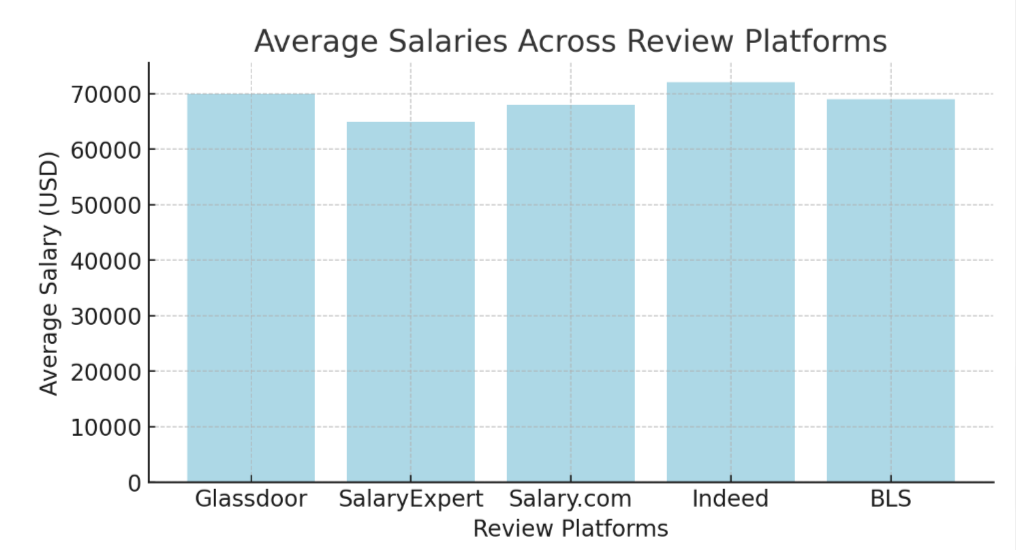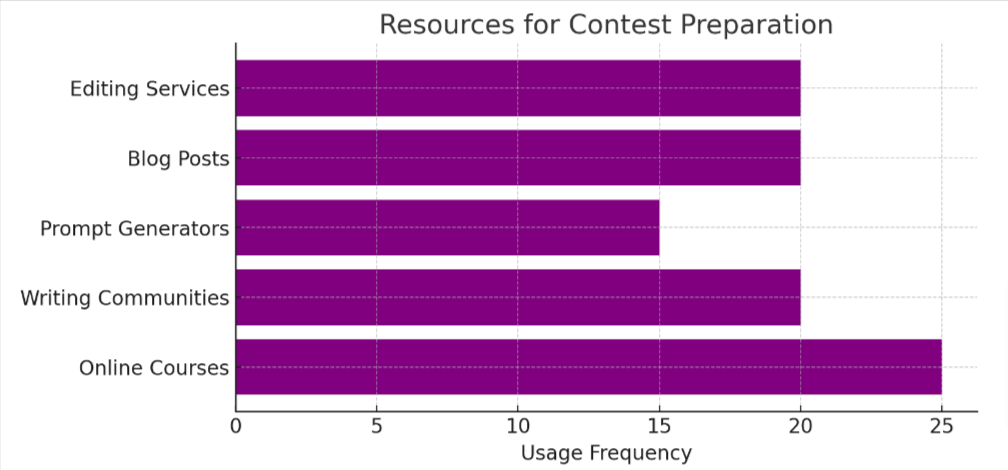Evaluating Review Platforms: Understanding Pay and Terms
Ever wonder if you’re getting paid enough at your job? Interesting fact: a study shows that employees who use salary comparison tools are more likely to feel satisfied with their pay.
This blog will guide you through the best review platforms for comparing wages and how they can help you land a fair deal. Keep reading—let’s talk money!
Key Takeaways
- Review platforms like Glassdoor, SalaryExpert, Salary.com, Indeed, and the Bureau of Labor Statistics provide valuable data for individuals to compare salaries across different job levels and industries.
- Factors such as job title, industry location, experience level, education qualifications, and unique skills all play a significant role in influencing an individual’s salary.
- Preparing for salary negotiations involves researching these factors on comparison platforms to understand one’s market worth and being ready to highlight personal value and skills.
- Being flexible during salary discussions can lead to positive outcomes; besides base pay rates consider negotiating additional benefits or perks.
- Regularly updating knowledge on job market trends through review platforms helps ensure that compensation remains competitive over time.
The Importance of Salary Comparison
Understanding job market trends and negotiating fair compensation are crucial factors in career growth. By comparing pay rates and terms across review platforms, individuals can gain valuable insights into the current salary landscape and make informed decisions about their careers.
Understanding job market trends
Keeping track of job market trends is crucial for negotiating a salary that reflects your value and the demand for your skills. Salary surveys and compensation analysis tools can reveal what employers are paying for specific job levels across various industries.
This information helps you see where pay rates are headed and which sectors might be booming or cooling down. Knowledge about market pay trends empowers you to make informed career decisions, ensuring you’re not settling for less than the going rate.
Staying updated with wage comparison data also allows you to identify wage disparities within fields or regions, providing leverage during compensation discussions. A thorough look at compensation percentiles tells you if your paycheck is on par with others in similar positions, both locally and nationally.
Being armed with this kind of detailed pay scale evaluation puts you in a stronger position when it’s time to talk numbers with current or potential employers, as it shows them that your requests are backed by solid market evidence rather than just personal expectations.
Negotiating fair compensation
Having a firm grasp on job market trends empowers you to step into negotiations with confidence. To ensure fair compensation, it’s crucial to arrive armed with the latest salary research and pay data.
Before entering discussions, conduct a thorough salary survey specific to your industry and level. Knowing the average wage for your position in your area can serve as a strong foundation for talks.
Present yourself as an informed professional by discussing compensation percentiles and market pay standards during negotiations. Utilize concrete figures from reliable review platforms that reflect accurate rates and contracts; this way, you can effectively argue for a salary that mirrors both your expertise and the going rate in your field.
Stick to clear facts rather than vague expectations, showing how your requested pay aligns with established benchmarks.
The Best Salary Comparison Platforms
Glassdoor, SalaryExpert, Salary.com, Indeed, and the Bureau of Labor Statistics are some of the best platforms for comparing salary information across industries and job titles. Each platform offers unique features to help individuals understand their market worth and negotiate fair compensation.
Glassdoor
Glassdoor shines as a go-to platform for employees and job seekers who want to get a realistic picture of what companies pay. Users contribute anonymously, sharing salaries, company reviews, interview questions, and more.
This wealth of information helps you to benchmark your salary against others in similar positions and industries. It’s like getting an insider’s view of the compensation landscape before stepping foot into an interview or performance review.
As you explore Glassdoor’s extensive database, you’ll discover how job levels affect pay rates across different sectors. Use their salary calculator to pinpoint where you stand within compensation percentiles for your role.
With each review offering insights into terms and conditions, including benefits and work-life balance, this platform arms you with comprehensive data crucial for informed compensation analysis and effective negotiation strategies.
SalaryExpert
After exploring the insights from Glassdoor, another platform worth considering is SalaryExpert. This resource provides comprehensive pay data and salary comparison across various job levels, industries, and locations.
Users can access detailed compensation percentiles and comparatio information for accurate market pay assessment. SalaryExpert also offers valuable tools for compensation analysis to benchmark salaries and evaluate wage disparities.
When comparing pay rates and terms across review platforms, delving into the data provided by SalaryExpert can offer a deeper understanding of industry standards, enabling informed negotiations and fair compensation discussions.
Salary.com
Salary.com provides comprehensive salary data and job market insights, allowing users to compare pay rates across different industries, job levels, and locations. With intuitive search features, users can easily access up-to-date compensation information to make informed decisions about their career paths.
By leveraging Salary.com’s vast database of job titles and corresponding pay scales, individuals can gain a better understanding of their worth in the current job market.
Moreover, Salary.com offers valuable tools for employers to benchmark compensation against industry standards and ensure competitive pay rates for their workforce. Through detailed compensation analysis and comparison features, businesses can confidently develop fair salary structures that align with employee expectations while remaining competitive in attracting top talent.
Indeed
Indeed provides a comprehensive database of job listings, offering a wide range of salary information for different positions and industries. Users can easily compare pay rates and terms across various review platforms, gaining valuable insights into market trends and compensation packages.
Moreover, the platform allows individuals to research and analyze wage data based on industry, location, experience level, and education. With its user-friendly interface and extensive pay data, Indeed is an invaluable resource for professionals seeking to benchmark their income against industry standards.
By leveraging the wealth of information available on Indeed, job seekers can make informed decisions about potential employment opportunities by comparing compensation packages from different employers.

Bureau of Labor Statistics
After exploring various review platforms for salary comparison, another valuable resource for comprehensive wage and compensation data is the Bureau of Labor Statistics. This authoritative source provides detailed information on pay rates across different industries, occupations, and geographic locations.
Through its surveys and reports, it offers insights into prevailing wages, employment trends, and benefits packages to help individuals make informed decisions about their careers.
Employing robust methodologies and extensive data collection efforts, the Bureau of Labor Statistics equips job seekers and employers with reliable information to navigate the complexities of compensation negotiations.
Factors Affecting Salary
The salary for a particular job is influenced by several factors including the job title, industry, location, experience, education, and special skills. Each of these factors can impact the pay rate and terms across different review platforms.
Job title
Compare pay rates and terms across different review platforms to gain a comprehensive understanding of compensation in your industry. Analyze salary data, market pay, and compensation percentiles to negotiate fair terms and ensure you’re being compensated appropriately.
Utilize platforms like Glassdoor, SalaryExpert, Salary.com, Indeed, and the Bureau of Labor Statistics for accurate wage disparity assessment and employee compensation comparison.
Evaluate job match and comparatio data based on factors like job level, industry, location, experience, education, special skills to gauge where you stand in the market pay scale evaluation.
Industry
Different industries have varying salary ranges and compensation structures. Factors such as demand for specific skills, market trends, and the level of education or experience required can significantly impact pay rates in different sectors.
For instance, technology and healthcare are often known for offering competitive salaries due to high demand and specialized skill requirements. On the other hand, fields like retail and hospitality may offer lower starting salaries but provide opportunities for advancement through experience and dedication.
Understanding these industry-specific variations is crucial when comparing pay rates across review platforms. Job seekers must consider not only the average national salary but also how these figures differ within their chosen field.
Analyzing industry-specific data can empower individuals to negotiate fair compensation based on their unique qualifications and the standards set by their respective sectors.
Location
When considering compensation, location plays a crucial role in determining pay rates. The cost of living and demand for certain positions can vary significantly from one area to another, affecting the salaries offered.
Moreover, companies in different regions may have distinct budget allocations for employee compensation based on market trends and economic factors such as local industry growth.
Understanding the geographical influence on pay rates is essential for accurate salary comparison. Employees must consider how location impacts their earning potential when evaluating job offers or seeking better opportunities within their field.
Experience
Gaining experience in the industry is essential for understanding the nuances of salary comparison. As individuals work and progress through different job levels, they encounter varying compensation packages based on their expertise and skills.
This practical exposure helps them grasp the importance of aligning pay rates with their qualifications and market standards.
Engaging with diverse compensation terms across review platforms allows professionals to develop a comprehensive understanding of industry norms. Such exposure sharpens their negotiation skills when seeking fair compensation, ultimately contributing to a more transparent and equitable job market landscape.
Education
When negotiating salary, education is a crucial factor that can significantly impact pay rates. Individuals with higher levels of education tend to command higher salaries than those with lower educational qualifications in most industries.
Employers often value candidates with advanced degrees or specialized certifications, offering them more competitive compensation packages. Therefore, investing in further education could lead to increased earning potential and career advancement opportunities.
Education also plays a key role in determining an individual’s eligibility for certain job levels and positions within an organization. Many companies have specific educational requirements for different roles, and individuals who meet these requirements are likely to qualify for higher-paying positions.
Special skills
Your special skills can significantly impact your earning potential. Employers often pay a premium for specialized abilities that are in high demand within the industry. Highlighting these unique skills during salary negotiations could result in higher compensation and better job offers.
The market value of particular proficiencies may fluctuate based on trends, so staying updated on industry demands is crucial to leveraging your special skills effectively.
In addition, possessing rare or sought-after talents can set you apart from other candidates, making you a more valuable asset to employers. Consistently demonstrating and improving upon these distinctive aptitudes can position you as a top performer in your field, ultimately leading to greater financial rewards and career opportunities.

Tips for Successful Salary Negotiation
Research and compare salary information from various platforms to have a clear understanding of the market pay. Know your worth and be prepared to highlight your value and skills during negotiation.
Research and compare salary information
When researching and comparing salary information, it is essential to consider factors such as job title, industry, location, experience, education, and special skills. By evaluating pay rates and terms across review platforms like Glassdoor and Indeed, individuals can gain a comprehensive understanding of the current job market trends and negotiate fair compensation better.
This comparison allows for a more informed approach towards seeking or negotiating employment opportunities.
Salary comparison helps individuals identify their worth in the market and equips them with valuable insights for successful negotiation strategies. It enables them to prepare for negotiations by highlighting their value and skill set effectively.
Know your worth

Research and compare salary information to understand your value in the job market. Highlight your skills, experience, and qualifications during negotiations to ensure fair compensation.
Be prepared to advocate for yourself confidently.
Understanding your worth is crucial when negotiating salaries or considering new opportunities. By knowing where you stand in terms of pay data, you can confidently ask for what you deserve without settling for less.
Prepare for the negotiation
After knowing your worth, the next step is to prepare for the negotiation. Start by gathering all the essential data about salary ranges for similar positions in your industry and location.
Highlight your achievements and skills that demonstrate your value as an employee. Practice articulating your points confidently but be open to compromise during the negotiation process.
Researching pay data on reliable platforms will help you to understand how much others in similar roles are earning. Knowing this information can give you confidence in asking for fair compensation during negotiations with potential employers or when seeking a raise at your current job.
Highlight your value and skills
Demonstrate your unique skills and accomplishments during the negotiation process. Clearly communicate how your expertise and experience align with the company’s needs. Emphasize specific achievements that illustrate your ability to contribute positively to the organization.
Articulate how your skill set can add value to the team and help achieve company goals. Use concrete examples of successful projects or initiatives you’ve led to demonstrate your capabilities.
Effectively showcasing your worth will strengthen your position during salary discussions and increase the likelihood of securing fair compensation for your skills and contributions.
Be open to compromise
During salary negotiations, it’s essential to be open to compromise. This means being willing to consider alternative terms or benefits if the initial pay rate doesn’t meet your expectations.
By remaining flexible, you can build a positive rapport with the employer and find a middle ground that satisfies both parties. Remember, compromise doesn’t equate to settling – it’s about finding a solution that is mutually beneficial.
In addition to considering salary adjustments, be open to discussing other aspects of the job such as additional vacation days, remote work options, professional development opportunities, or performance-based bonuses.
Conclusion
After comparing pay rates and terms across review platforms, you can make informed decisions about your compensation. Understanding job market trends and researching salary data gives you an edge in negotiating fair pay.
By evaluating different factors affecting salary, such as job title, industry, location, experience, education, and special skills, you can determine your worth accurately. Use these tips to successfully negotiate a competitive salary that reflects your value and skills while being open to compromise when necessary.

